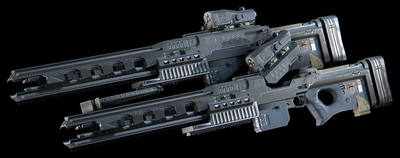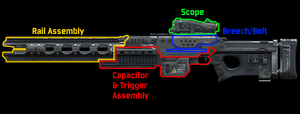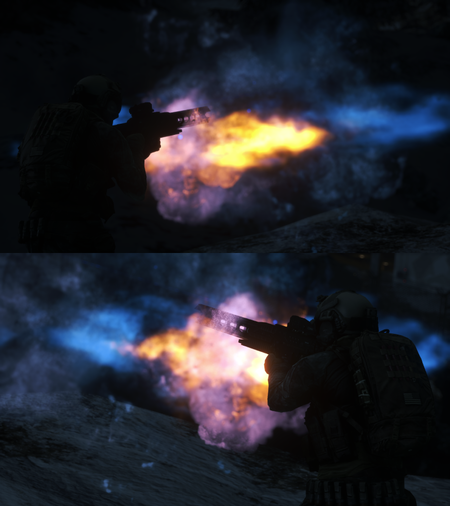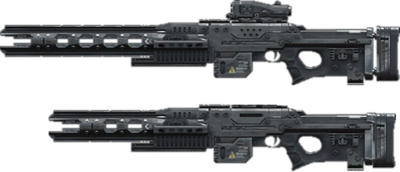mNo edit summary |
No edit summary |
||
| Line 31: | Line 31: | ||
Despite the shortened rail length, the weapon is still extremely accurate out beyond the range of the Mark IX, allowing it to act as both a designated marksman rifle and a machine gun, using accurate semi-automatic fire at long ranges and cyclic automatic fire at closer ranges for suppressive effects. | Despite the shortened rail length, the weapon is still extremely accurate out beyond the range of the Mark IX, allowing it to act as both a designated marksman rifle and a machine gun, using accurate semi-automatic fire at long ranges and cyclic automatic fire at closer ranges for suppressive effects. | ||
[[Category:Advanced | [[Category:Advanced Weaponry]] | ||
Revision as of 16:41, 14 February 2018

The Mark 1 Mod. 0 "Railgun", known formally as the Mark 1 Special Applications Anti-Armor Weapon (SAAAW) and referred to colloquially as the "Saw" or "The Left Hand of God" is a prototype man-portable, shoulder-fired anti-materiel weapon that propels heavy saboted projectiles at hypersonic velocities.
Design

Measuring in at 1.26 meters in length and weighing nearly 30 pounds, the weapon is far too unwieldy for regular infantry use. As such, it is issued on a team-by-team basis, with one member of the team designated as the operator with two other people designated as ammo bearers and/or assistant gunners. There are two major components of the Mark 1, the weapon, which consists of the capacitor and trigger assembly, break-action, and smart scope, and the rail assembly, which is one large piece that is removable from the weapon.
The capacitor assembly starts at the end of the trigger guard and extends through the fuze box and protrudes slightly underneath the rail assembly. The fuze box, marked clearly by a yellow caution sign, has one switch on it to reset the circuit breakers, as they must be reset after each round. The trigger itself is a two-stage design, and, providing that the capacitors are active, a short pull will feed power to the rails and the targeting laser, allowing for rapid target acquisition, and a full, long pull will fire the weapon. There is a short 1-second charging time for the capacitors once the trigger is depressed, however, which cannot be bypassed with a long pull. Located above the trigger is a manual safety switch, which blocks the trigger and power from the capacitors.
The break-action loading ramp is opened by an ambidextrous switch located underneath it. There is a small, rifled barrel inside, where the round is inserted. The small charge on the end of the saboted slug is fired from the open bolt, which must be manually cycled by means of a charging handle on the right hand side of the weapon.

The scope sits on top of the break-action ramp and is coupled to both a rangefinder and targeting laser, automatically compensating for distance. The laser shines blue by default, although the colors are changeable. The charge progress is displayed in the scope lens.
The rail set is removable from the main weapon, allowing for easier transport as it is over half of the weapon's overall length. To remove it, there is a clamp on the right side of the weapon that can be pulled upwards and around to the top of the weapon, thus unlocking the rails. Removal is as simple as sliding the rail assembly out of the weapon, and putting it back together is the exact opposite procedure.
The latest iteration, the Mark 1 Mod. 1, builds off of operational feedback from Blue Team agents in the field, reducing the overall weight of the weapon from 30 pounds to about 25 pounds. Additionally, racking the bolt back and forth now resets the fuze box and charges the weapon, allowing for faster follow-up shots. There are plans to create smaller sets of rails for confined spaces, as well as different types of ammunition.
Ammunition
The newest version of standard ammunition used in the Mk. 1 is a 12.7mm cup-saboted ferro-nickel alloy slug with a depleted uranium core and a slug length of roughly 120mm, crimped into a shortened 12.7mm case with a small amount of propellant. When the weapon is fired from the open bolt, the small charge propels the projectile into the rails, where it is rapidly accelerated to upwards of Mach 10. This design function technically disqualifies the Mk. 1 from being classified as a railgun, although it is still referred to as one for brevity's sake.
Operation
To set it up from the travelling carry position, the operator must first remove both the weapon and the rails from their bags and put them together. Next, the safety selector must be switched off and the fuse box should be switched to the READY position. One round should then be loaded, and the bolt should be pulled back. Before firing, the operator must check their side areas to ensure nobody will be caught by the side blast. Once the sides are secure, the shooter should declare that the side blast area is secure, and then both the gunner and the assistant gunner should announce the firing by both yelling "railgun" in succession. Then, the weapon is clear to fire.
Mark X Light Support Weapon

The Mark X Light Support Weapon Kit has recently been introduced as an add-on kit for all Mark 1 Railguns as a set of shortened rails shipped with a new ambidextrous-loading breech system designed to accept 5x15mm railgun rounds, which can be added on to any existing Mark 1 railgun to effectively turn it from a special-applications weapon into a squad-level support weapon firing at a cyclic rate of fire of about 900 rounds per minute.
It is relatively lighter than the M240 ST, at about 15 pounds loaded, while retaining ammo and magazine commonality with the more common Mark IX railgun. Additionally, the breech internals can easily be swapped for a normal Mark 1's in the field, allowing it to fire anti-armor rounds against hardened targets should the battlespace shift in a way that requires such a weapon. It can feed from either 250-round Mark IX magazines or specially-devised magnetic field-assisted 1000-round soft ammo packs.
Despite the shortened rail length, the weapon is still extremely accurate out beyond the range of the Mark IX, allowing it to act as both a designated marksman rifle and a machine gun, using accurate semi-automatic fire at long ranges and cyclic automatic fire at closer ranges for suppressive effects.